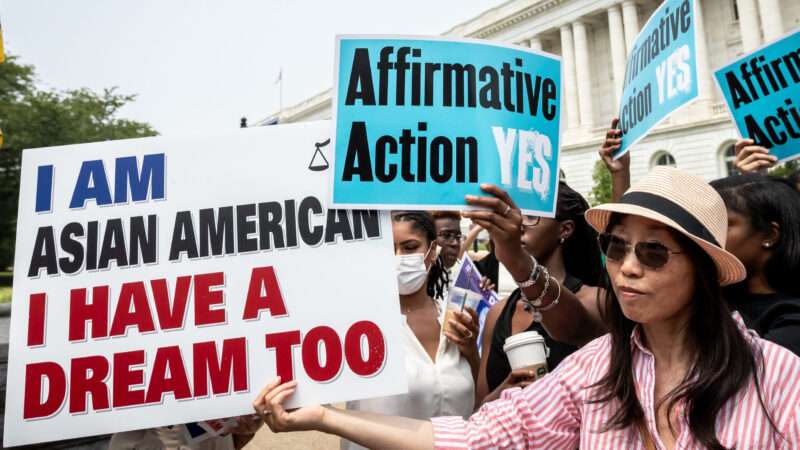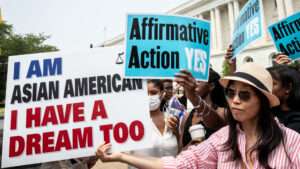

Many of the people who strongly oppose the use of racial preferences for affirmative action are also strong supporters of tight immigration restrictions. Few see any contradiction between these two positions. But, as Cato Institute immigration policy scholar Alex Nowrasteh points out in a recent post, immigration restrictions are a form of affirmative action for natives. They undermine meritocracy in much the same way as racial preferences in higher education do, except much more so:
The recent Supreme Court case about affirmative action in university admissions (SFFA v. Harvard) paralleled a broader social debate over meritocracy. Those opposed to affirmative action broadly say they are supportive of meritocracy. They believe individual achievement should be more prominent in university admissions, at least when the government is involved in university funding. The debate over affirmative action and meritocracy intersects with the immigration debate in two ways. First, immigration restrictions are the most destructive form of affirmative action. Second, immigrants and their descendants have been essential in reducing the scope of affirmative action in the United States over the last 30 years….
U.S. immigration restrictions are the most anti‐meritocratic policies today, and they are intended as affirmative action for native‐born Americans…. Just peruse nativist websites, and you'll see many arguments about immigrants taking jobs from more Americans who are more deserving because of where they were born. When people think of anti‐meritocratic policies, they rightly jump to quotas, race‐based affirmative action, or class‐based affirmative action….
It's true; those are all anti‐meritocratic and likely wouldn't exist in a free market outside of a handful of organizations in the non‐profit sector. But U.S. immigration restrictions are worse. The U.S. population is about 4.2 percent of the global population. Immigration laws prevent the other 95.8 percent of the world from trying their hand in the U.S. market meritocracy.
I made a similar argument in this 2020 post:
There is disagreement about exactly what qualifies as meritocracy. But, generally speaking, meritocrats believe that important educational and economic opportunities should be distributed primarily based on some combination of skill, talent, and hard work, not based on arbitrary circumstances of birth outside students' and job applicants' control. The paradigmatic opposite of meritocracy is a system of hereditary aristocracy, in which opportunities are distributed primarily based on who your parents are…..
Today, hereditary aristocracy is widely condemned in liberal democratic societies. Even relatively limited forms of it come in for widespread criticism. For example, many point out that "legacy admissions" at elite universities are unmeritocratic, and should be rejected for that reason…. Conservatives and other critics of affirmative action for racial minorities similarly argue that an applicant's race or ethnicity are outside her control and in and of themselves tell us nothing about her merit.
But that which is widely condemned in the domestic context is equally widely accepted when it comes to migration restrictions—even though the departure from meritocracy is far greater in the latter case. Our system of immigration restrictions—and that used by most other nations—is essentially a form of hereditary aristocracy by another name….
For most people, citizenship status determines where you are allowed to live and work, which in turn largely determines not only your economic fate, but often whether you will have protection for even very minimal human rights. And citizenship itself is largely determined by birth—much like membership in old-time aristocracies. If you were not born a US citizen or a close relative of one, there is very little chance you will ever be allowed to emigrate here…..
The deviation from meritocracy here is vastly greater than those many complain about in other contexts. If you were born in Cuba, Venezuela, or Zimbabwe, and migration restrictions force you to stay there, you are highly unlikely to ever escape poverty and oppression—no matter how talented, hard-working, or otherwise meritorious you might be….
By contrast, if legacy preferences or affirmative action prevent you from getting admitted to Harvard…., there is a good chance you can still attend a selective college, often one that is just one rung down from the one that rejected you. There is still a deviation from meritocracy. But it's far smaller than in the case of migration restrictions.
Conservative meritocrats are quick to condemn affirmative action programs premised on the assumption that we need to give blacks and Hispanics a leg up against whites and Asians. But these meritocratic principles are forgotten when it comes to immigration restrictions. That happens even though the departure from meritocracy is far greater in the case of the latter. Moreover, unlike African-Americans and some other minority groups, native-born citizens can't plausibly claim they deserve affirmative action preferences in order to compensate them for historic injustices, such as slavery and segregation.
In this respect, immigration restrictions are actually more akin to legacy preferences than affirmative action for historically discriminated-against minorities. Both represent a form of privilege for the already advantaged. Even for relatively poor Americans, being born in the US and growing up here is a major advantage relative to the conditions faced by migrants who were born and raised in poor and oppressive societies.
Racial discrimination and immigration restrictions are also akin in being driven by zero-sum logic. The implicit assumption is that there is a fixed set of opportunities and the only way to benefit Group A is at the expense of B, and vice versa. Thus, for example, old-time segregationists argued that we must protect white workers against black and Asian competition. Immigration restrictionists claim that gains to immigrant workers necessarily come at the expense of natives. "Woke" leftists argue that progress for minorities depends on racial preferences in education and employment.
In a certain sense, this is true. If a black worker beats out a white one for a job, the latter loses out. Ditto if an immigrant beats out a native. But focusing on this narrow frame overlooks the ways in which opening up opportunities to more people benefits all of society, including previously advantaged groups. My co-blogger David Bernstein explained why in a 2016 post:
Virulent racists and anti-racist activists would seem to have little in common, but in fact they tend to agree on one mistaken premise: Race relations are a zero-sum game. If whites are doing well, it's at the expense of members of other races. If members of other races are doing well, it's at the expense of whites….
In fact, whites, as a group, don't benefit from discrimination against, or oppression of, other groups, except perhaps psychologically if such discrimination and oppression make them feel superior…. But from a purely economic perspective, wealth comes from gains from trade, and the wealthier your trading partners, the more wealth you can accrue….
[C]onsider as a real-world example the huge opening of economic opportunities for women in the past 50 years. Men, as a group, may have lost some psychic benefit in feeling superior to women, and one can argue about the social effects on marriage and family, but men as a group are much better off economically now that women can pursue all sorts of careers that were closed to them in the past. In pursuing careers commensurate with their talent, women make American society much wealthier, which means that men have better doctors, better products to buy, better job opportunities and so on….
The same dynamic applies, though not as obviously, when a majority imposes economic restrictions on a minority, whether through law, custom or some combination thereof. Let's say a young African American man born in 1920 had the potential to be a great scientist, but because of discrimination and racism instead wound up enmeshed in the criminal justice system. How did that benefit the majority? The majority lost whatever scientific contributions that individual could have made, was at risk of being victimized by his criminal behavior and had to use its tax money to pay for any jail time he may have served. Even if a potential scientist becomes a laborer rather than a criminal because of racism, that's still a loss to society, including to the white majority. Multiply such scenarios by millions of people, and the huge economic loss to the majority should become clear.
David's logic applies to immigration restrictions as well as to domestic gender and racial discrimination. I outlined the reasons why here. Indeed, immigration restrictions have a massive negative impact on the freedom and prosperity of native-born Americans, perhaps more so than any other federal government policy.
A few whites were still net beneficiaries of discrimination against blacks. For example, if you were a marginal white Major League Baseball player who lost his job as a result of the integration of baseball in the 1940s, it is possible that the gains of integration for you weren't enough to offset the loss of what might be a vastly better career than anything you could find elsewhere. The same goes for a modern native-born athlete who is denied a job in the NBA or the National Hockey League because of competition from immigrant players. But, on the whole, whites have benefited greatly from reductions in racial discrimination enabling minorities to access a wider range of careers, and natives from the economic contributions of immigrants.
In the last part of his post, Nowrasteh also notes that increased immigration since the 1960s has helped undermine affirmative action politically. In particular, the growing presence of Asian students in higher education has weakened traditional rationales for racial preferences. I discussed this aspect of the issue myself, here.
Ironically, conservatives who rightly condemn anti-Asian discrimination in educational institutions often embrace it when it comes to immigration. Law professor Amy Wax is a particular egregious, but far from unique, example. Many on the left have similar double standards, in the opposite direction.
As noted in my 2020 post on immigration and meritocracy, I am not a pure meritocrat myself. My views on these issues are primarily driven by considerations of liberty, justice, and increasing human welfare. If we can become wealthier, happier and freer, by being less meritocratic, I'm willing to take that tradeoff. But when it comes to immigration, domestic racial discrimination, and legacy preferences, meritocracy and these other considerations go hand in hand. A more meritocratic society on these fronts is also likely to be freer, wealthier, and more just.
At the very least, those value meritocracy highly should take a far dimmer view of immigration restrictions than many of them currently do. If you truly oppose hereditary privilege, you cannot exempt from scrutiny what is by far the biggest example of it in our society.
The post Immigration Restrictions as Affirmative Action for Natives appeared first on Reason.com.







